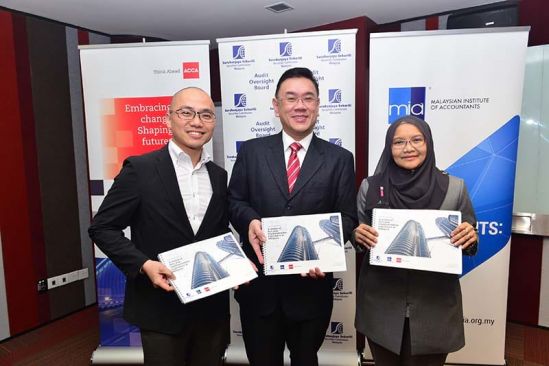A joint study on the first-year implementation of the enhanced auditors’ report (EAR) revealed that key users of audit and financial reports found value in the new reporting standards with two thirds of the surveyed respondents acknowledging that it is an improvement compared to the old auditors’ report.
Titled “Enhanced Auditors’ Report: A review of first-year implementation experience in Malaysia”, the joint study was conducted by the Audit Oversight Board (AOB) of the Securities Commission Malaysia (SC), the Malaysian Institute of Accountants (MIA) and the ACCA (Association of Chartered Certified Accountants) to assess stakeholders’ response to the new and revised enhanced auditor reporting standards.
AOB, MIA and ACCA were in agreement that the EAR has spurred constructive behavioural changes within the financial reporting ecosystem and improved engagement between investors and companies in Malaysia.
This follows early pre-implementation efforts such as SC’s establishment of the Steering Committee comprising key individuals1 representing the regulators, accounting and auditing profession, and public listed companies in June 2015 to identify implementation issues and risks, as well as to develop strategies and provide guidance on those issues and risks identified.
Alex Ooi Thiam Poh, Executive Officer of SC’s AOB, said: “We have always viewed EAR as a game-changer – affecting all stakeholders in the financial reporting system who each has its own role to play in promoting high quality financial reporting and corporate governance practices.”
“The first-year results are encouraging, and the finance and accounting functions should strive for continued improvement to better support effective communication among auditors, management and audit committees. Investors can also ask more pertinent questions relating to KAMs during AGMs to directors, management and auditors which will lead to further strengthening the corporate governance practices of listed companies.”
Dr Nurmazilah Dato’ Mahzan, Chief Executive Officer of Malaysian Institute of Accountants, said the move to encourage auditor to be more transparent in communicating their work and insights have definitely driven positive change throughout the financial reporting supply chain, in relations to the overall perception and processes.
“However, there are still opportunities for all parties in the financial reporting supply chain to further improve the implementation of the EAR and increase its value towards providing useful and relevant information flow to the Malaysian capital market,” she said. She added that MIA will continue to provide implementation support to the audit profession and educating other stakeholders on their role to reap the full benefits of EAR.
Chiew Chun Wee, Regional Head of Policy, Asia Pacific, ACCA and board member on the International Auditing and Assurance Standards Board said: “EAR is a tool. The effectiveness of a tool depends on the conviction of those who wield it. We have seen a promising start to the implementation of EAR in Malaysia, but more can be done to fully extract the value of this enhanced form of communication and heighten the level of transparency and trust in the information flow within the capital market.”
“Ultimately, we should see a greater realisation in the value of audit. It is important to recognise that the benefits are available not just to the largest entities but to the smaller listed companies and SMPs too, as long as all parties involved apply the right mind-sets and efforts to doing it right.”
The enhanced auditor reporting standards were issued by the International Auditing and Assurance Standards Board and adopted in Malaysia in 2015, with an effective date of 15 December 2016. The results from this study are based on the review of EARs and annual reports of a sample of 190 companies listed on Bursa Malaysia with financial periods ended 31 December 2016, as well as views from over 170 audit committee members and investors.
The enhanced auditors’ report placed greater prominence on the auditors’ opinion and a key change introduced through EAR is the disclosure of Key Audit Matters (KAMs), resulting in a more transparent and informative auditors’ report. In the longer term, EAR is expected to drive the flow of useful and relevant information to the capital market, reduce speculation on company performance and promote better understanding of financial statements.


